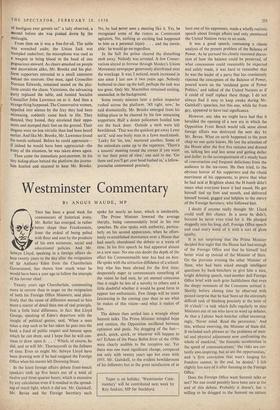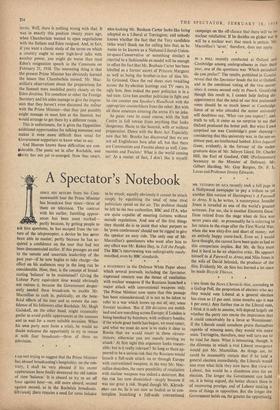Westminster Commentary
BY ANGUS MAUDE, MP Twenty years ago Chamberlain, commenting more in sorrow than in anger on the resignation of both his Foreign Office Ministers, said plain- tively that the cause of difference seemed .to him more a matter of detail than one of real principle. Just a little local difference, in fact. But Lloyd George, speaking of Eden's departure with the insight of political genius, said, 'When a man takes a step such as he has taken he puts into the bank a fund of public respect and honour upon which he can draw, and I hope that he will con- tinue to draw upon it. . . .' Which, of course, he did; and so will Mr. Thorneycroft in the fullness of time. Even so might Mr. Selwyn Lloyd have been drawing now if he had resigned the Foreign Office when his master left Downing Street.
In the latest foreign affairs debate front-bench speakers took up 'five hours out of a total of twelve and three-quarter hours, which is excessive by any calculation even if it resulted in the spread- ing of much light, which it did not. Mr. Gaitskell, Mr. Bevan and the Foreign Secretary each spoke for nearly an hour, which is intolerable.
The Prime Minister lowered the average sharply, being commendably brief in his two speeches. He also spoke with authority, particu- larly on his second appearance, when he effort- lessly re-established dominance over a House that had nearly abandoned the debate as a waste of time. In his first speech he had appeared almost as a new man. No one can doubt the depth of the effect his Commonwealth tour has had on him. He spoke with the attractive diffidence of a school- boy who has been abroad for the first time; desperately eager to communicate something of the vision he had seen, he yet seemed conscious that it might be less of a novelty to others and a little doubtful whether it would be good form to appear too enthusiastic. Few things will be more fascinating in the coming year than to see what he makes of this vision—and what it makes of him.
The debate then settled into a wrangle about Summit talks. The Prime Minister mingled hope and caution, the Opposition oscillated between optimism and panic. No dragging of the feet— quick, quick, quick, or whatever will happen to us? Echoes of the Peace Ballot fever of the 1930s were clearly audible to the receptive ear. Yet there was one most significant change, compared not only with twenty years ago but even with 1955. Mr. Gaitskell, to the evident bewilderment of his followers but to the great satisfaction of at least one of his opponents, made a wholly realistic speech about foreign affairs and only ,mentioned the United Nations twice in an aside.
It was a good speech, containing a classic analysis of the present problem of the Balance of Power. As he pursued his closely reasoned discus- sion of how the balance could be preserved, of what concessions could reasonably be expected and safely made, it was hard to remember that he was the leader of a party that has consistently rejected. the conception of the Balance of Power, poured scorn on the 'outdated game of Power Politics,' and talked of the United Nations as if it could of itself replace these things. I do not always find it easy to keep awake during Mr. Gaitskell's speeches, but this one, while far from gay, appeared to have real significance.
However, any idea we might have had that it heralded the opening of a new era in which the Opposition Front Bench would talk sense about foreign affairs was destroyed the next day by Mr. Bevan. What on earth happened to the poor chap no one quite knows. He lost the attention of the House after the first five minutes and droned on, talking less and less sense and getting duller and duller, to the accompaniment of a steady buzz of conversation and frequent defections from the audience to the tea-room. He then tried, to the obvious horror of his supporters and the ribald merriment of his opponents, to prove that what he had said at Brighton about the H-bomb didn't mean what everyone knew it had meant. He got himself tied up foot and mouth, and delivered himself bound, gagged and helpless to the mercy of the Foreign Secretary, who followed him.
I doubt if anyone really thought Mr. Lloyd could muff this chance. In a sense he didn't, because he never even tried for it. 'He plunged doggedly into his long, dull, Foreign Office speech and read every word of it with a sort of glum apathy.
It is not surprising that the Prime Minister decided that night that the House had had enough of the Foreign Office and that he himself had better wind up instead of the Minister of State. On the previous evening the other Minister of State, who had been asked enough intelligent' questions by back-benchers to give him a nice, bright debating speech, read another dull Foreign Office brief with such grim faithfulness that even the sleepy remnants of the Commons noticed it. Shortly before closing time he observed with pained surprise that he had 'been set the extremely difficult task of finishing precisely at the hour of 10 o'clock'—a task which falls regularly to nine Ministers out of ten who have to wind up debates. At that a Labour back-bencher called encourag- ingly, 'Never mind. Read the peroration.' And this, without swerving, the Minister of State did. It included such phrases as 'the problems of men- tal and physical adjustment now confronting the whole of mankind,' the fantastic acceleration in the speed of communications,' the risks are cer- tainly awe-inspiring, but so are the opportunities,' and 'a firm conviction that man's longing for freedom cannot, in the end, be denied.' I felt slightly less sure of it after listening to the Foreign Office.
Does the Foreign Office want Summit talks or not? No one could possibly have been sure at the end of this debate. Probably it doesn't, but is willing to be dragged to the Summit on certain terms. Well, there is nothing wrong with that. It was in exactly this position twenty years ago, when Chamberlain wanted to open negotiations with the Italians and Eden resigned. And, in fact, if you want a classic study of the terms on which a country ought to enter high-level talks with another power, you might do worse than read Eden's resignation speech in the Commons on February 21, 1938. The interesting thing is that the present Prime Minister has obviously learned the lesson that Chamberlain missed; Mr. Mac- millan's observations about the preparations for the Summit were modelled pretty closely on the Eden doctrine. Yet somehow or other the Foreign Secretary and his aides manage to give the impres- sion that they haven't even discussed the matter with the Prime Minister—that they just possibly might manage to meet him at the Summit, but would arrange to get there by a different route.
This is unfortunate, for it gives the Opposition additional opportunities for talking nonsense, and makes it even more difficult than usual for Government supporters to know what to say.
And Heaven knows these difficulties are con- siderable. .The panic set in after Rochdale, and clarity has not yet re-emerged. Now that smart, nice-looking Mr. Bonham Carter looks like being adopted as a Liberal at Torrington; and nobody knows whether the fact that the Tory candidate (who won't thank me for calling him that, as he wants to be known as a National-Liberal-Union- ist-quasi-Conservative or something similar) is married to a fashionable ex-model will be enough to offset the fact that Mr. Bonham Carter has been labelled as a former escort of Princess Margaret as well as being the brother-in-law of nice Mr. Jo Grimond. Once the red shoes start twinkling across the by-election hustings and TV rears its ugly lens, then indeed the poor politician is in a sad state. Give him another politician to fight and he can counter one Speaker's Handbook with the appropriate counterblasts from the other. But with all these amateurs entering the arena it's no joke.
So panic runs its usual course, with the Soft Centre in full retreat from anything that looks `dangerous. Haste to the Summit, with or without preparation. Down with the Rent Act. Especially now that Mr. Brooke has discovered that we are not all Englishmen here after all, but that there are Communists and Fascists about as well. Com- munists and Fascists! What is the world coming to? As a matter of fact, 1 don't like it myself:



































 Previous page
Previous page